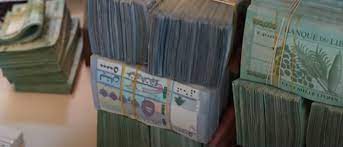3 February 2022
Mr Assaii Makes a Withdrawal.
Lebanon’s financial meltdown.
By Neil Tidmarsh

Last week, Abdallah Assaii became a world-famous bank robber. He wheeled a suitcase into his local branch of the BBAC bank in Lebanon and took his place in the queue of other suitcase-wheeling customers, who were making the most of the central bank’s latest dubious scheme to increase the country’s dollar holdings. Unlike the other customers’ suitcases, however, Mr Assaii’s suitcase wasn’t stuffed with dollar notes. It was packed with cans of petrol which he apparently splashed about the place while demanding cash. He allegedly held the bank’s staff in a room until they handed over $50,000. He turned himself in to the police, but not before he’d slipped the cash to his wife who is still at large with the booty.
But he can’t be prosecuted for robbery, according to his lawyers. Why not? Because it was his own money. His balance with the bank was exactly $50,000, which is why he demanded that exact sum; a modest target for a bank heist, but not a cent more nor less than he had in his account. So why on earth didn’t he just ask for a banker’s draft and make a simple withdrawal?
Lebanon is suffering the world’s worst economic crisis. “Since the end of the civil war in the 1990s, Lebanon’s economy has been based on unsustainably high levels of debt, with the country attracting foreign capital by offering high interest rates, themselves funded by more borrowing” wrote Campbell McDiarmid in The Telegraph this week. Predictably, the government has defaulted on its debts, the banks have imposed very strict limits on withdrawals, the value of the Lebanese pound has collapsed, and even accounts in US dollars are paid out only in the local currency and only at a fraction of their dollar value. “Lebanon’s banks have lost most of their customers’ money“ wrote Richard Spencer in The Times, but “the government has so far failed to agree any reorganisation of the financial system, meaning that the bankers have held on to their profits as their customers starve.”
Bailout talks between the government and the International Monetary Fund began last year, but promptly collapsed due to conflict between rival political factions. They resumed this week, but this was followed by a report from the World Bank which pulled no punches in apportioning blame for two years of meltdown; “Lebanon’s deliberate depression is orchestrated by the country’s elite that has long captured the state and lived off its economic rents… It has come to threaten the country’s long-term stability and social peace.”
The country is plagued by corruption, mismanagement, patronage, nepotism and foreign interference thanks to that elite and to a sectarian-based political system (the president is usually a Christian, the prime minister a Sunni Muslim and the speaker of parliament a Shiite Muslim), an entrenched power-sharing arrangement which encourages political in-fighting and executive paralysis. Severe fuel shortages mean frequent power cuts and massive queues at petrol stations, capital controls mean that people can’t access their savings, and the country is being drained of experienced and qualified workers as they emigrate in search of better opportunities elsewhere.
In August 2020, a cargo of 2750 tonnes of ammonium nitrate exploded in Beirut’s port. It killed 275 people, wounded another 7000, made 300,000 homeless, caused $15 billion of damage, literally shook the whole country and was heard 150 miles away in Cyprus. This shocking tragedy was blamed on the country’s corrupt and incompetent elites (the cargo had apparently been negligently stored by the authorities), but so far little has changed to bring about a more just social order. Elections are due this May, but they’re unlikely to threaten the status quo.
Abdallah Assaii is typical of the country’s struggling businessmen. In 2019 he sold family land for $400,000 and invested it in his wholesale business, only to be hit hard when the country went into financial meltdown in March 2020. He opened a coffee shop but it was robbed last year. Suppliers of fruit and veg to his stalls were demanding payment but he couldn’t access his savings due to the bank’s capital controls. He was desperate to pay his creditors but the bank turned down his requests to withdraw his own money. When he saw other people trundling suitcases full of dollar notes into the bank – the central bank has just launched a highly-questionable scheme to stock up on US dollars by allowing people who still have cash in that currency to swop it at a profit (apparently at the tax-payers’ expense) – something just snapped. It seemed that there was only one way he could get hold of his savings and pay his debts. But by all accounts he was extremely apologetic to the staff of his local branch of BBAC bank as he went about it.
He’s been hailed as a hero by his fellow citizens. Demands for his release are deafening. He has just gone on hunger strike. The banks are on the back foot about their ruinous capital controls, and no doubt they’re bracing themselves for more direct action by the people whose savings they seem to have lost. And Mr Assaii’s wife, wherever she is, must be putting his money to good use at last.


